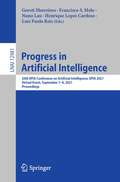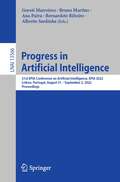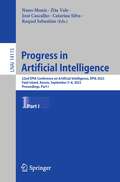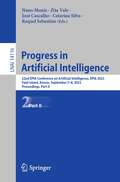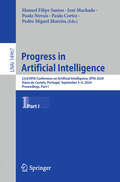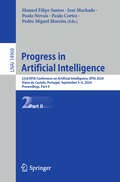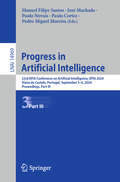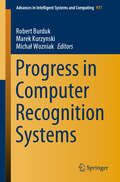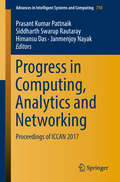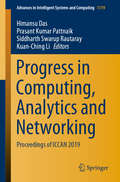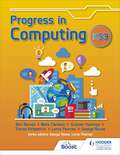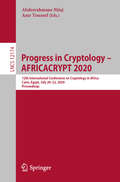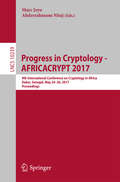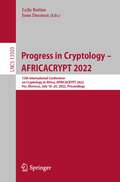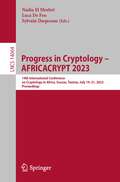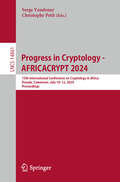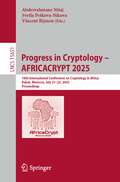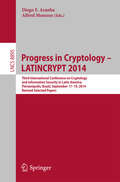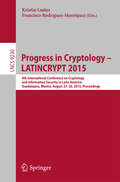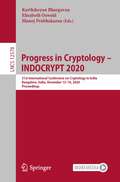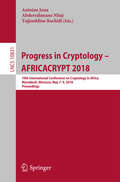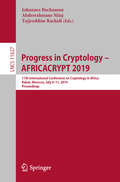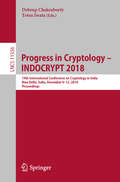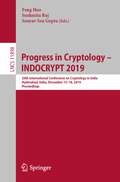- Table View
- List View
Progress in Artificial Intelligence: 20th EPIA Conference on Artificial Intelligence, EPIA 2021, Virtual Event, September 7–9, 2021, Proceedings (Lecture Notes in Computer Science #12981)
by Luís Paulo Reis Goreti Marreiros Henrique Lopes Cardoso Nuno Lau Francisco S. MeloThis book constitutes the refereed proceedings of the 20th EPIA Conference on Artificial Intelligence, EPIA 2021, held virtually in September 2021.The 62 full papers and 6 short papers presented were carefully reviewed and selected from a total of 108 submissions. The papers are organized in the following topical sections: artificial intelligence and IoT in agriculture; artificial intelligence and law; artificial intelligence in medicine; artificial intelligence in power and energy systems; artificial intelligence in transportation systems; artificial life and evolutionary algorithms; ambient intelligence and affective environments; general AI; intelligent robotics; knowledge discovery and business intelligence; multi-agent systems: theory and applications; and text mining and applications.
Progress in Artificial Intelligence: 21st EPIA Conference on Artificial Intelligence, EPIA 2022, Lisbon, Portugal, August 31–September 2, 2022, Proceedings (Lecture Notes in Computer Science #13566)
by Goreti Marreiros Bernardete Ribeiro Ana Paiva Bruno Martins Alberto SardinhaThis book constitutes the proceedings of the 21st EPIA Conference on Artificial Intelligence, EPIA 2022, which took place in Lisbon, Portugal, in August/September 2022. The 64 papers presented in this volume were carefully reviewed and selected from 85 submissions. They were organized in topical sections as follows: AI4IS - Artificial Intelligence for Industry and Societies; AIL - Artificial Intelligence and Law; AIM - Artificial Intelligence in Medicine; AIPES - Artificial Intelligence in Power and Energy Systems; AITS - Artificial Intelligence in Transportation Systems; AmIA - Ambient Intelligence and Affective Environments; GAI - General AI; IROBOT - Intelligent Robotics; KDBI - Knowledge Discovery and Business Intelligence; KRR - Knowledge Representation and Reasoning; MASTA - Multi-Agent Systems: Theory and Applications; TeMA - Text Mining and Applications.
Progress in Artificial Intelligence: 22nd EPIA Conference on Artificial Intelligence, EPIA 2023, Faial Island, Azores, September 5–8, 2023, Proceedings, Part I (Lecture Notes in Computer Science #14115)
by Zita Vale Catarina Silva Nuno Moniz José Cascalho Raquel SebastiãoThe two-volume set LNAI 14115 and 14116 constitutes the refereed proceedings of the 22nd EPIA Conference on Progress in Artificial Intelligence, EPIA 2023, held in Faial Island, Azores, in September 2023.The 85 full papers presented in these proceedings were carefully reviewed and selected from 163 submissions. The papers have been organized in the following topical sections: ambient intelligence and affective environments; ethics and responsibility in artificial intelligence; general artificial intelligence; intelligent robotics; knowledge discovery and business intelligence; multi-agent systems: theory and applications; natural language processing, text mining and applications; planning, scheduling and decision-making in AI; social simulation and modelling; artifical intelligence, generation and creativity; artificial intelligence and law; artificial intelligence in power and energy systems; artificial intelligence in medicine; artificial intelligence and IoT in agriculture; artificial intelligence in transportation systems; artificial intelligence in smart computing; artificial intelligence for industry and societies.
Progress in Artificial Intelligence: 22nd EPIA Conference on Artificial Intelligence, EPIA 2023, Faial Island, Azores, September 5–8, 2023, Proceedings, Part II (Lecture Notes in Computer Science #14116)
by Zita Vale Catarina Silva Nuno Moniz José Cascalho Raquel SebastiãoThe two-volume set LNAI 14115 and 14116 constitutes the refereed proceedings of the 22nd EPIA Conference on Progress in Artificial Intelligence, EPIA 2023, held in Faial Island, Azores, in September 2023.The 85 full papers presented in these proceedings were carefully reviewed and selected from 163 submissions. The papers have been organized in the following topical sections: ambient intelligence and affective environments; ethics and responsibility in artificial intelligence; general artificial intelligence; intelligent robotics; knowledge discovery and business intelligence; multi-agent Systems: theory and applications; natural language processing, text mining and applications; planning, scheduling and decision-making in AI; social simulation and modelling; artifical intelligence, generation and creativity; artificial intelligence and law; artificial intelligence in power and energy systems; artificial intelligence in medicine; artificial intelligence and IoT in agriculture; artificial intelligence in transportation systems; artificial intelligence in smart computing; artificial intelligence for industry and societies.
Progress in Artificial Intelligence: 23rd EPIA Conference on Artificial Intelligence, EPIA 2024, Viana do Castelo, Portugal, September 3–6, 2024, Proceedings, Part I (Lecture Notes in Computer Science #14967)
by Paulo Cortez Paulo Novais José Machado Manuel Filipe Santos Pedro Miguel MoreiraThe 3-volume set LNAI 14967, 14968, and 14969 constitutes the proceedings of the 23rd EPIA Conference on Artificial Intelligence, EPIA 2024, held in Viana do Castelo, Portugal, during September 3–6, 2024. The 94 full papers presented in these proceedings were carefully reviewed and selected from 187 submissions. The papers are organized in the following topical sections: Volume I: AI and Creativity (AIC); Ambient Intelligence and Affective Environments (AmIA); Artificial Intelligence and IoT in Agriculture (AIoTA); Artificial Intelligence and Law (AIL); and Artificial Intelligence for Industry and Societies (AI4IS). Volume II: Artificial Intelligence in Medicine (AIM); Artificial Intelligence in Power and Energy Systems (AIPES); Artificial Intelligence in Transportation Systems (AITS); Ethics and Responsibility in AI (ERAI); and General AI (GAI). Volume III: Generative AI – Foundations and Applications (GenAI); Intelligent Robotics (IROBOT); Knowledge Discovery and Business Intelligence (KDBI); Natural Language Processing, Text Mining and Applications (TeMA); and Data-Centric AI – Solutions and Emerging Technologies (DCenAI).
Progress in Artificial Intelligence: 23rd EPIA Conference on Artificial Intelligence, EPIA 2024, Viana do Castelo, Portugal, September 3–6, 2024, Proceedings, Part II (Lecture Notes in Computer Science #14968)
by Paulo Cortez Paulo Novais José Machado Manuel Filipe Santos Pedro Miguel MoreiraThe 3-volume set LNAI 14967, 14968, and 14969 constitutes the proceedings of the 23rd EPIA Conference on Artificial Intelligence, EPIA 2024, held in Viana do Castelo, Portugal, during September 3–6, 2024. The 94 full papers presented in these proceedings were carefully reviewed and selected from 187 submissions. The papers are organized in the following topical sections: Volume I: AI and Creativity (AIC); Ambient Intelligence and Affective Environments (AmIA); Artificial Intelligence and IoT in Agriculture (AIoTA); Artificial Intelligence and Law (AIL); and Artificial Intelligence for Industry and Societies (AI4IS). Volume II: Artificial Intelligence in Medicine (AIM); Artificial Intelligence in Power and Energy Systems (AIPES); Artificial Intelligence in Transportation Systems (AITS); Ethics and Responsibility in AI (ERAI); and General AI (GAI). Volume III: Generative AI – Foundations and Applications (GenAI); Intelligent Robotics (IROBOT); Knowledge Discovery and Business Intelligence (KDBI); Natural Language Processing, Text Mining and Applications (TeMA); and Data-Centric AI – Solutions and Emerging Technologies (DCenAI).
Progress in Artificial Intelligence: 23rd EPIA Conference on Artificial Intelligence, EPIA 2024, Viana do Castelo, Portugal, September 3–6, 2024, Proceedings, Part III (Lecture Notes in Computer Science #14969)
by Paulo Cortez Paulo Novais José Machado Manuel Filipe Santos Pedro Miguel MoreiraThe 3-volume set LNAI 14967, 14968, and 14969 constitutes the proceedings of the 23rd EPIA Conference on Artificial Intelligence, EPIA 2024, held in Viana do Castelo, Portugal, during September 3–6, 2024. The 94 full papers presented in these proceedings were carefully reviewed and selected from 187 submissions. The papers are organized in the following topical sections: Volume I: AI and Creativity (AIC); Ambient Intelligence and Affective Environments (AmIA); Artificial Intelligence and IoT in Agriculture (AIoTA); Artificial Intelligence and Law (AIL); and Artificial Intelligence for Industry and Societies (AI4IS). Volume II: Artificial Intelligence in Medicine (AIM); Artificial Intelligence in Power and Energy Systems (AIPES); Artificial Intelligence in Transportation Systems (AITS); Ethics and Responsibility in AI (ERAI); and General AI (GAI). Volume III: Generative AI – Foundations and Applications (GenAI); Intelligent Robotics (IROBOT); Knowledge Discovery and Business Intelligence (KDBI); Natural Language Processing, Text Mining and Applications (TeMA); and Data-Centric AI – Solutions and Emerging Technologies (DCenAI).
Progress in Computer Recognition Systems (Advances in Intelligent Systems and Computing #977)
by Robert Burduk Marek Kurzynski Michał WozniakThis book highlights recent research on computer recognition systems, one of the most promising directions in artificial intelligence. Offering the most comprehensive study on this field to date, it gathers 36 carefully selected articles contributed by experts on pattern recognition. Presenting recent research on methodology and applications, the book offers a valuable reference tool for scientists whose work involves designing computer pattern recognition systems. Its target audience also includes researchers and students in computer science, artificial intelligence, and robotics.
Progress in Computing, Analytics and Networking: Proceedings Of Iccan 2017 (Advances In Intelligent Systems And Computing #710)
by Prasant Kumar Pattnaik Himansu Das Siddharth Swarup Rautaray Janmenjoy NayakThe book focuses to foster new and original research ideas and results in three broad areas: computing, analytics, and networking with its prospective applications in the various interdisciplinary domains of engineering. This is an exciting and emerging interdisciplinary area in which a wide range of theory and methodologies are being investigated and developed to tackle complex and challenging real world problems. It also provides insights into the International Conference on Computing Analytics and Networking (ICCAN 2017) which is a premier international open forum for scientists, researchers and technocrats in academia as well as in industries from different parts of the world to present, interact, and exchange the state of art of concepts, prototypes, innovative research ideas in several diversified fields. The book includes invited keynote papers and paper presentations from both academia and industry to initiate and ignite our young minds in the meadow of momentous research and thereby enrich their existing knowledge. The book aims at postgraduate students and researchers working in the discipline of Computer Science & Engineering. It will be also useful for the researchers working in the domain of electronics as it contains some hardware technologies and forthcoming communication technologies.
Progress in Computing, Analytics and Networking: Proceedings of ICCAN 2019 (Advances in Intelligent Systems and Computing #1119)
by Kuan-Ching Li Prasant Kumar Pattnaik Himansu Das Siddharth Swarup RautarayThis book focuses on new and original research ideas and findings in three broad areas: computing, analytics, and networking and their potential applications in the various domains of engineering – an emerging, interdisciplinary area in which a wide range of theories and methodologies are being investigated and developed to tackle complex and challenging real-world problems. The book also features keynote presentations and papers from the International Conference on Computing Analytics and Networking (ICCAN 2019), which offers an open forum for scientists, researchers and technocrats in academia and industry from around the globe to present and share state-of-the-art concepts, prototypes, and innovative research ideas in diverse fields. Providing inspiration for postgraduate students and young researchers working in the field of computer science & engineering, the book also discusses hardware technologies and future communication technologies, making it useful for those in the field of electronics.
Progress in Computing: Key Stage 3
by George Rouse Lorne Pearcey Ben Barnes Tristan Kirkpatrick Graham Hastings Mark ClarksonReboot your Key Stage 3 classroom with this all-in-one textbook that will inspire you to deliver creative Computing lessons with confidence.> Boost knowledge and skills in bite-sized chunks: every double-page spread represents a lesson's worth of targeted content and activities > Build understanding of the principles of Computing and improve IT skills with a range of engaging activities> Challenge students to think creatively about what they are learning and how it can be applied in the real world> Empower students to check and drive their own progress through Key Stage 3 and to GCSE, Cambridge Nationals and BTEC, and beyond, with regular knowledge check-ins and activities> Ensure complete coverage of the National Curriculum, with an easy-to-follow Progression FrameworkWe've listened to how you teach Computing at Key Stage 3 and designed our brand-new toolkit of digital and printed resources around you! Comprising of everything you will need to confidently deliver the National Curriculum in Computing and develop students' ICT skills, Progress in Computing: Key Stage 3 combines lesson plans, presentations, interactive resources, quizzes and assessments with a Student Book.The Progress in Computing digital and print 'toolkit' will be formed of 16 modules that can be used flexibly to suit a teacher's context. Our brand-new digital platform will also give you unparalleled flexibility in terms of choosing your own pathway through the resources, with the bonus of all elements being tagged clearly against the curriculum, our 2 and 3-year Scheme of Work and progression to Key Stage 4 qualifications.Digital resources include: - videos, animations, online self-marking coding challenges and worksheets - teaching and learning support and lesson plans including course planners for centres in England and Wales- a mixture of teacher-led, teacher-facilitated, plugged and unplugged activities- baseline assessment and an end of Key Stage 3 assessment, with auto-marked homework quizzes and end-of-module assessments track progress throughout the course. Sign up to our eUpdates to find out how to access our digital resources!
Progress in Computing: Key Stage 3
by George Rouse Lorne Pearcey Ben Barnes Tristan Kirkpatrick Graham Hastings Mark ClarksonReboot your Key Stage 3 classroom with this all-in-one textbook that will inspire you to deliver creative Computing lessons with confidence.> Boost knowledge and skills in bite-sized chunks: every double-page spread represents a lesson's worth of targeted content and activities > Build understanding of the principles of Computing and improve IT skills with a range of engaging activities> Challenge students to think creatively about what they are learning and how it can be applied in the real world> Empower students to check and drive their own progress through Key Stage 3 and to GCSE, Cambridge Nationals and BTEC, and beyond, with regular knowledge check-ins and activities> Ensure complete coverage of the National Curriculum, with an easy-to-follow Progression FrameworkWe've listened to how you teach Computing at Key Stage 3 and designed our brand-new toolkit of digital and printed resources around you! Comprising of everything you will need to confidently deliver the National Curriculum in Computing and develop students' ICT skills, Progress in Computing: Key Stage 3 combines lesson plans, presentations, interactive resources, quizzes and assessments with a Student Book.The Progress in Computing digital and print 'toolkit' will be formed of 16 modules that can be used flexibly to suit a teacher's context. Our brand-new digital platform will also give you unparalleled flexibility in terms of choosing your own pathway through the resources, with the bonus of all elements being tagged clearly against the curriculum, our 2 and 3-year Scheme of Work and progression to Key Stage 4 qualifications.Digital resources include: - videos, animations, online self-marking coding challenges and worksheets - teaching and learning support and lesson plans including course planners for centres in England and Wales- a mixture of teacher-led, teacher-facilitated, plugged and unplugged activities- baseline assessment and an end of Key Stage 3 assessment, with auto-marked homework quizzes and end-of-module assessments track progress throughout the course.
Progress in Cryptology - AFRICACRYPT 2020: 12th International Conference on Cryptology in Africa, Cairo, Egypt, July 20 – 22, 2020, Proceedings (Lecture Notes in Computer Science #12174)
by Abderrahmane Nitaj Amr YoussefThis book constitutes the refereed proceedings of the 12th International Conference on the Theory and Application of Cryptographic Techniques in Africa, AFRICACRYPT 2020, held in Cairo, Egypt, in July 2020. The 21 papers presented in this book were carefully reviewed and selected from 49 submissions. The papers are organized in topical sections on zero knowledge, symmetric key cryptography, elliptic curves, post quantum cryptography, lattice based cryptography, side channel attacks, cryptanalysis and new algorithms and schemes. AFRICACRYPT is a major scientific event that seeks to advance and promote the field of cryptology on the African continent. The conference has systematically drawn some excellent contributions to the field. The conference has always been organized in cooperation with the International Association for Cryptologic Research (IACR).
Progress in Cryptology - AFRICACRYPT 2017: 9th International Conference on Cryptology in Africa, Dakar, Senegal, May 24-26, 2017, Proceedings (Lecture Notes in Computer Science #10239)
by Marc Joye and Abderrahmane NitajThis book constitutes the refereed proceedings of the 9th International Conference on the Theory and Application of Cryptographic Techniques in Africa, AFRICACRYPT 2017, held in Dakar, Senegal, in May 2017.The 13 papers presented in this book were carefully reviewed and selected from 40 submissions. The papers are organized in topical sections on cryptographic schemes, side-channel analysis, differential cryptanalysis, applications, and number theory.
Progress in Cryptology - AFRICACRYPT 2022: 13th International Conference on Cryptology in Africa, AFRICACRYPT 2022, Fes, Morocco, July 18–20, 2022, Proceedings (Lecture Notes in Computer Science #13503)
by Lejla Batina Joan DaemenThis book constitutes the refereed proceedings of the 13th International Conference on Progress in Cryptology in Africa, AFRICACRYPT 2022, held in Fes, Morocco, from July 18th - 20th, 2022. The 25 papers presented in this book were carefully reviewed and selected from 68 submissions. The papers are organized in topical sections on symmetric cryptography; attribute and identity based encryption; symmetric cryptanalysis; post-quantum cryptography; post-quantum (crypt)analysis; side-channel attacks; protocols and foundations; public key (crypt) analysis.
Progress in Cryptology - AFRICACRYPT 2023: 14th International Conference on Cryptology in Africa, Sousse, Tunisia, July 19–21, 2023, Proceedings (Lecture Notes in Computer Science #14064)
by Sylvain Duquesne Nadia El Mrabet Luca De FeoThis volume contains the papers accepted for presentation at Africacrypt 2023, the 14th International Conference on the Theory and Application of Cryptographic Techniques in Africa. The 21 full papers included in this book were carefully reviewed and selected from 59 submissions. They were organized in topical sections as follows: Post-quantum cryptography; Symmetric cryptography; Cryptanalysis; Blockchain; Lattice-based cryptography; Implementations; Theory.
Progress in Cryptology - AFRICACRYPT 2024: 15th International Conference on Cryptology in Africa, Douala, Cameroon, July 10–12, 2024, Proceedings (Lecture Notes in Computer Science #14861)
by Christophe Petit Serge VaudenayThis book constitutes the refereed proceedings of the 15th International Conference on Cryptology in Africa, AFRICACRYPT 2024, held in Douala, Cameroon, in July 2024. The 19 full papers included in this book were carefully reviewed and selected from 35 submissions. They are organized in topical sections as follows: symmetric key cryptography; advanced primitives; post-quantum cryptography; elliptic curve cryptography and RSA; lattice-based cryptography constructions; and lattice-based cryptography cryptanalysis.
Progress in Cryptology - AFRICACRYPT 2025: 16th International Conference on Cryptology in Africa, Rabat, Morocco, July 21–23, 2025, Proceedings (Lecture Notes in Computer Science #15651)
by Abderrahmane Nitaj Svetla Petkova-Nikova Vincent RijmenThis book constitutes the refereed proceedings of the 16th International Conference on Cryptology in Africa, AFRICACRYPT 2025, which took place in Rabat, Morocco in July 2025. The 21 full papers presented in this volume were carefully reviewed and selected from 45 submissions. They are grouped into the following topics: Homomorphic Encryption; Cryptanalysis of RSA; Cryptography Arithmetic; Side-channel Attacks; Designs; Cryptanalysis.
Progress in Cryptology - LATINCRYPT 2014
by Diego F. Aranha Alfred MenezesThis book constitutes the proceedings of the 3rd International Conference on Cryptology and Information Security in Latin America, LATINCRYPT 2014, held in Florianópolis, Brazil, in September 2014. The 19 papers presented together with four invited talks were carefully reviewed and selected from 48 submissions. The papers are organized in topical sections on cryptographic engineering, side-channel attacks and countermeasures, privacy, crypto analysis and cryptographic protocols.
Progress in Cryptology -- LATINCRYPT 2015
by Kristin Lauter Francisco Rodríguez-HenríquezThis book constitutes the proceedings of the 4th International Conference on Cryptology and Information Security in Latin America, LatinCrypt 2015, held in Guadalajara, Mexico, in August 2015. The 20 papers presented were carefully reviewed and selected from 49 submissions. They were organized in topical sections named: cryptographic protocols; foundations; post-quantum cryptography; symmetric key cryptanalysis; we still love pairings; curves in cryptography; and cryptographic engineering.
Progress in Cryptology – INDOCRYPT 2020: 21st International Conference on Cryptology in India, Bangalore, India, December 13–16, 2020, Proceedings (Lecture Notes in Computer Science #12578)
by Elisabeth Oswald Karthikeyan Bhargavan Manoj PrabhakaranThis book constitutes the refereed proceedings of the 21st International Conference on Cryptology in India, INDOCRYPT 2020, held in Bangalore, India, in December 2020.The 39 full papers presented together with 3 invited abstracts in this book were carefully reviewed and selected from 84 submissions. Apart from its traditional focus on areas in applied and theoretical cryptology, this year INDOCRYPT solicited papers in the area of Formal Methods for Cryptographic Systems as well and much more.
Progress in Cryptology – AFRICACRYPT 2018: 10th International Conference On Crytology In Africa, Marrakesh, Morocco, May 7-9, 2018, Proceedings (Lecture Notes in Computer Science #10831)
by Abderrahmane Nitaj Tajjeeddine Rachidi Antoine JouxThis book constitutes the refereed proceedings of the 10th International Conference on the Theory and Application of Cryptographic Techniques in Africa, AFRICACRYPT 2018, held in Marrakesh, Morocco, in May 2018. The 19 papers presented in this book were carefully reviewed and selected from 54 submissions. AFRICACRYPT is a major scientific event that seeks to advance and promote the field of cryptology on the African continent. The conference has systematically drawn some excellent contributions to the field. The conference has always been organized in cooperation with the International Association for Cryptologic Research (IACR).
Progress in Cryptology – AFRICACRYPT 2019: 11th International Conference on Cryptology in Africa, Rabat, Morocco, July 9–11, 2019, Proceedings (Lecture Notes in Computer Science #11627)
by Johannes Buchmann Abderrahmane Nitaj Tajjeeddine RachidiThis book constitutes the refereed proceedings of the 11th International Conference on the Theory and Application of Cryptographic Techniques in Africa, AFRICACRYPT 2019, held in Rabat, Morocco, in July 2019. The 22 papers presented in this book were carefully reviewed and selected from 53 submissions. The papers are organized in topical sections on protocols; post-quantum cryptography; zero-knowledge; lattice based cryptography; new schemes and analysis; block ciphers; side-channel attacks and countermeasures; signatures. AFRICACRYPT is a major scientific event that seeks to advance and promote the field of cryptology on the African continent. The conference has systematically drawn some excellent contributions to the field. The conference has always been organized in cooperation with the International Association for Cryptologic Research (IACR).
Progress in Cryptology – INDOCRYPT 2018: 19th International Conference on Cryptology in India, New Delhi, India, December 9–12, 2018, Proceedings (Lecture Notes in Computer Science #11356)
by Tetsu Iwata Debrup ChakrabortyThis book constitutes the refereed proceedings of the 19th International Conference on Cryptology in India, INDOCRYPT 2018, held in New Delhi, India, in December 2018. The 20 revised full papers presented in this book were carefully reviewed and selected from 60 submissions. The focus of the conference includes works on outsourced computation and searchable encryption; symmetric key cryptography and format preserving encryption; fault attacks and Hash functions; post quantum cryptography; asymmetric key cryptography and cryptanalysis; symmetric key cryptanalysis; theory; and secure computations and protocols.
Progress in Cryptology – INDOCRYPT 2019: 20th International Conference on Cryptology in India, Hyderabad, India, December 15–18, 2019, Proceedings (Lecture Notes in Computer Science #11898)
by Feng Hao Sushmita Ruj Sourav Sen GuptaThis book constitutes the refereed proceedings of the 20th International Conference on Cryptology in India, INDOCRYPT 2019, held in Hyderabad, India, in December 2019. The 28 revised full papers presented in this book were carefully reviewed and selected from 110 submissions (of which 20 were either rejected without being reviewed or withdrawn before the deadline). The focus of the conference includes works on signatures and filter permutators; symmetric key ciphers and hash functions; blockchain, secure computation and blind coupon mechanism; oblivious transfer, obfuscation and privacy amplification; Boolean functions, elliptic curves and lattices; algorithms, attacks and distribution; and efficiency, side-channel resistance and PUFs.
